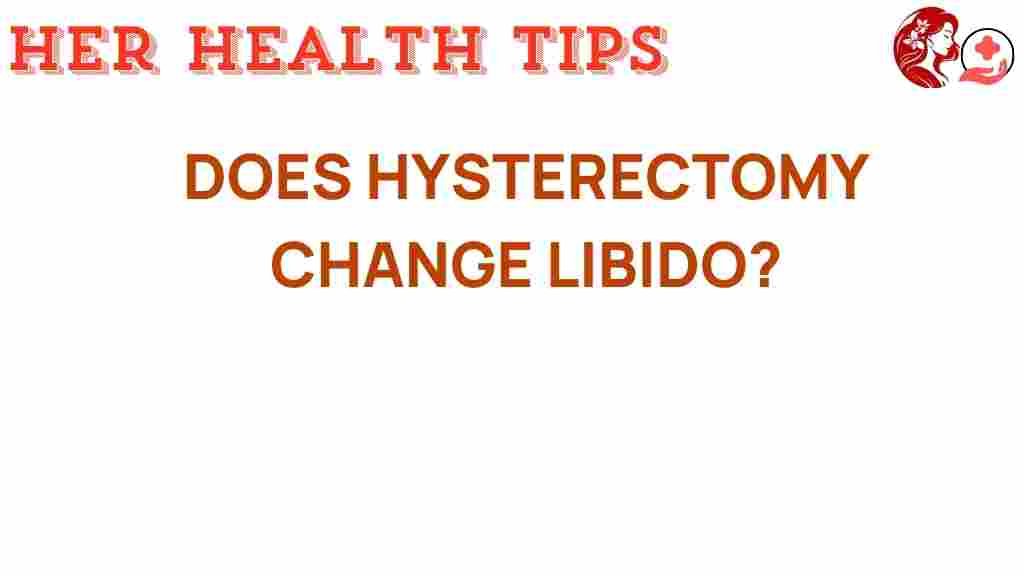Unraveling the Impact of Hysterectomy on Libido: What You Need to Know
Hysterectomy is a surgical procedure that involves the removal of the uterus, and in some cases, other reproductive organs. While it can be a necessary treatment for various medical conditions, many women are concerned about how this surgery may affect their libido and overall sexual health. Understanding the relationship between hysterectomy, hormones, and intimacy is crucial for women’s health. This article delves into the impact of hysterectomy on libido and offers insights on recovery, emotional well-being, and maintaining a fulfilling sexual life post-surgery.
Understanding Hysterectomy and Its Purpose
A hysterectomy can be performed for several reasons, including:
- Uterine fibroids
- Endometriosis
- Uterine prolapse
- Abnormal uterine bleeding
- Cancer of the uterus, cervix, or ovaries
The type of hysterectomy performed can vary, including:
- Partial Hysterectomy: Removal of the uterus while leaving the cervix intact.
- Total Hysterectomy: Removal of the uterus and cervix.
- Radical Hysterectomy: Removal of the uterus, cervix, surrounding tissues, and sometimes part of the vagina.
Each type of hysterectomy can have different implications for a woman’s sexual health and libido.
How Hysterectomy Affects Libido
After a hysterectomy, women’s sexual health can be influenced by several factors, including hormonal changes, physical recovery, and psychological impacts. Here’s how each of these factors can affect libido:
Hormonal Changes
One of the most significant impacts of a hysterectomy is the alteration of hormone levels. The uterus is not directly responsible for hormone production, but its removal can affect the ovaries and lead to changes in:
- Estrogen: This hormone is crucial for sexual desire and lubrication. A drop in estrogen levels can lead to vaginal dryness and reduced libido.
- Progesterone: Although not directly linked to libido, progesterone plays a role in the menstrual cycle and can influence mood and energy levels.
Women who undergo a hysterectomy may experience a decline in these hormones, especially if the ovaries are removed (oophorectomy). This can lead to symptoms of menopause, including decreased libido.
Physical Recovery
Post-surgery recovery can also impact libido. Women often experience physical discomfort, fatigue, and changes in body image, all of which can affect sexual desire. During recovery, it’s essential to be aware of the following:
- Most doctors recommend a recovery period of 6-8 weeks before engaging in sexual activity.
- It’s normal to experience some discomfort or changes in sexual function initially.
- Open communication with your partner about feelings and concerns can be beneficial.
Emotional Well-Being
The emotional aftermath of a hysterectomy can be significant. Women may experience feelings of loss, anxiety, or depression, which can further impact libido. It’s essential to address emotional health for a healthy sex life:
- Consider counseling or support groups to express and process feelings.
- Engage in activities that promote emotional well-being, such as mindfulness or yoga.
- Maintain a healthy relationship with your partner through open communication.
Steps to Enhance Libido After Hysterectomy
If you find that your libido has decreased after a hysterectomy, there are several steps you can take to enhance your sexual health and intimacy:
1. Consult Your Healthcare Provider
It’s essential to discuss any concerns about libido and sexual function with your healthcare provider. They may suggest:
- Hormone Replacement Therapy (HRT) to manage hormonal imbalances.
- Non-hormonal treatments for vaginal dryness, such as lubricants or moisturizers.
- Medications that can help improve sexual desire.
2. Focus on Physical and Emotional Recovery
Allow yourself time to heal physically and emotionally. Engage in gentle exercises to promote blood flow and improve mood. Activities such as walking, stretching, and pelvic floor exercises can be beneficial.
3. Communicate with Your Partner
Open and honest communication with your partner is crucial. Discuss what feels good, what doesn’t, and any fears or anxieties you may have. This can help foster intimacy and understanding.
4. Explore New Forms of Intimacy
Intimacy is not solely about sexual activity. Explore other forms of intimacy, such as:
- Cuddling
- Massage
- Spending quality time together
5. Educate Yourself
Understanding your body and its changes can empower you. Read articles and resources about post-hysterectomy sexual health. For more information, you can check out this external link for women’s health insights.
Troubleshooting Common Issues
Many women may face specific challenges regarding libido and sexual health after a hysterectomy. Here are some common issues and troubleshooting tips:
Vaginal Dryness
Vaginal dryness is a common concern after a hysterectomy. To address this, consider:
- Using water-based lubricants during intercourse.
- Applying vaginal moisturizers regularly.
- Discussing the possibility of hormone therapy with your healthcare provider.
Changes in Sexual Desire
If you notice a decrease in sexual desire, try these strategies:
- Engage in activities that foster emotional connection with your partner.
- Consider counseling if feelings of depression or anxiety persist.
- Explore new forms of sexual expression that may feel comfortable.
Physical Discomfort During Intercourse
If you experience discomfort during sex, it’s essential to:
- Communicate with your partner about what feels comfortable.
- Try different positions that may reduce discomfort.
- Consult your healthcare provider if the discomfort continues.
Conclusion
Hysterectomy can significantly impact libido and overall sexual health, but many women find ways to adapt and maintain fulfilling intimate relationships. Understanding the effects of hormonal changes, physical recovery, and emotional well-being is crucial. By addressing these aspects and seeking appropriate medical insights, women can navigate their journey to reclaim their libido and enhance their intimacy post-hysterectomy.
Remember, every woman’s experience is unique, and it’s essential to seek personalized advice from healthcare professionals. With the right support and strategies, you can continue to enjoy a vibrant and fulfilling sexual life.
For more information on women’s health and sexual wellness, consider visiting [insert internal link here].
This article is in the category Reproductive and created by HerHealthTips Team
